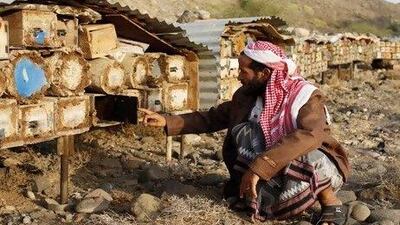The uprising in Yemen not only disrupted gas exports and pushed the country's crumbling economy closer to the brink - it also affected sales of another prized commodity.
Tomorrow's exclusives tonight:
Industry Insights e-newsletter
Stay ahead of the pack and get the pick of the premium Business content straight to your inbox.
Honey produced in the caves of Yemen's mountainous hinterlands is exported all over the world.
"Many people like that kind of honey. It has a delicious taste. One kilogram costs around Dh3,500 [US$952]," said Abdul Aziz Bamadhaf, the general manager of Bees Kingdom in Abu Dhabi. For about the same price per kilo you could buy several varieties of truffle or some Caspian black caviar.
The shop used to receive 50kg or 60kg of the honey every seven years. But exports have reduced to a trickle recently.
"We [haven't received] a lot of honey from Yemen because of the violence," Mr Bamadhaf said. "Transportation [is difficult]. They are going to increase the prices."
Egypt is the biggest producer of honey in the Middle East and North Africa region, according to Mr Bamadhaf. But experts say the best quality comes from Yemen.
"In Egypt we get around 30 tonnes a year," Mr Bamadhaf said. "Here we [produce] around five to 10 tonnes."
Prices fluctuate but are currently stable in the UAE.
"It depends on the quantity of the honey you get, so every year it is different. Last year it was much better than [the year before]," he said, adding that the weather affected production.
Honey has been a staple of the Middle East diet, and used for medicinal purposes, for centuries.
Mr Bamadhaf's business produces a powder from bee venom, which is used to treat rheumatoid arthritis.
"You can only use one gram per 50kg of honey and you have to mix it properly because one gram of bee venom is around 250 bites. It can kill someone. They can make 30,000 injections from just one gram," he says.
Follow our breaking business news and retweet to your followers.


